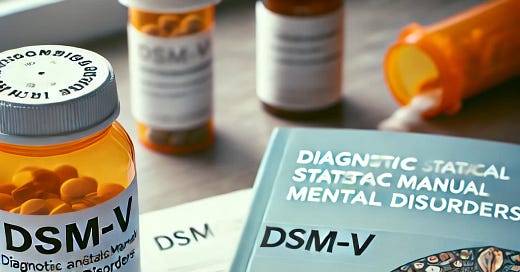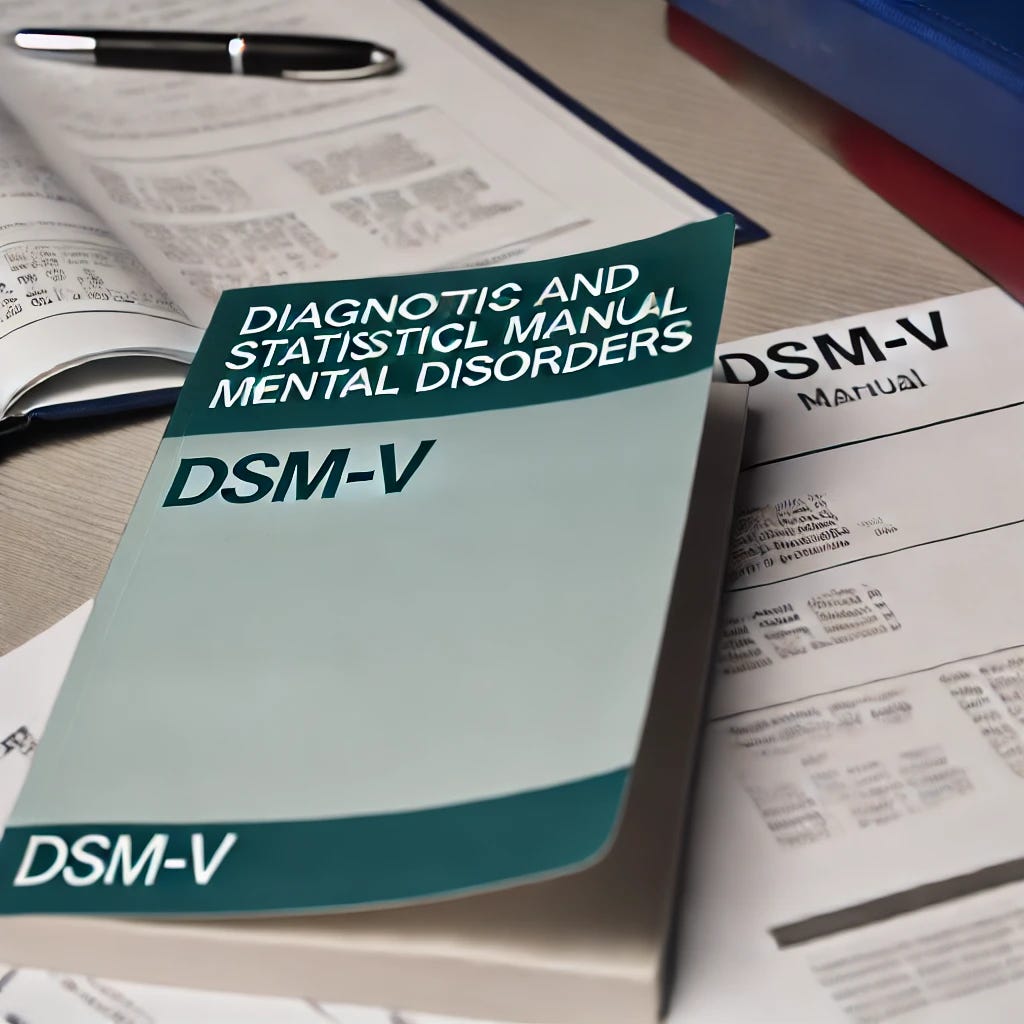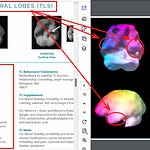By Richard Luthmann
The DSM-V, the Diagnostic and Statistical Manual of Mental Disorders, is often described as the "bible" of mental health professionals. But critics say the manual’s development process is deeply flawed, with lobbyists, interest groups, and even political agendas playing a more significant role than science.
Many are raising alarms about its integrity, with parental alienation at the heart of a heated debate.
Critics of the DSM-V, which the American Psychiatric Association (APA) published in 2013, argue that decisions about mental health diagnoses were not always grounded in science. Instead, the task force in charge often relied on consensus and voting rather than robust clinical evidence.
"Psychiatry is unable to depend on biological markers," said Robert Spitzer, who chaired the DSM-III Task Force, in an interview discussing the formation of the modern DSM.
He noted that voting and consensus often drove vital decisions, such as which disorders to include or remove. Critics say this lack of scientific rigor has persisted, prompting the suspicion that interest groups heavily influenced the final product.
The Power of Heuristics Over Science
The most significant criticism of DSM-V’s development is how it was shaped. Critical decisions were often made by task forces who voted on whether to include or exclude disorders. Voting occurred because psychiatry could not always depend on definitive biological or scientific evidence for some conditions.
Critics contend that the DSM process is one giant heuristic flaw.
Heuristics are mental shortcuts or rules of thumb that people use to make decisions more quickly and efficiently, often in situations where complete information or clear solutions are unavailable. While these strategies can save time and cognitive effort, they can lead to biased or flawed decisions.
Critics charge that task forces relied on heuristics in developing DSM-V by voting on whether to include or exclude mental disorders rather than solely on definitive scientific evidence. The reliance on voting reflects a heuristic approach, prioritizing consensus over exhaustive scientific validation, potentially leading to subjective and politically influenced decisions.
Spitzer explained that consensus was central to decision-making:
“If a large enough number of clinicians felt that a diagnostic concept was important in their work, we were likely to add it.”
While ensuring clinicians reached an agreement, this voting system opened the door to influence from outside parties. The most contentious point is whether these task forces were genuinely acting in the best interest of patients or responding to pressure from powerful lobbyists.
“The manual is an industry in and of itself,” wrote one critic, arguing that the DSM’s production had close ties to the pharmaceutical industry.
The DSM's decisions have significant financial and professional stakes, with the ability to open up new markets for drugs and services tied to specific disorders. The broadening of some diagnoses, such as depression and anxiety, seemed to serve as evidence for those who believe lobbyists helped expand conditions requiring medication.
Some argue that the influence of pharmaceutical companies is particularly problematic.
"It’s no secret that the pharmaceutical industry has had its hands in shaping how mental health disorders are classified,” said one observer familiar with the manual's development.
The implication is that the broadening of some diagnoses, such as generalized anxiety disorder, creates an environment where prescribing medications becomes the default solution.
A 2017 report revealed that some DSM panel members had financial ties to pharmaceutical companies. These ties raised ethical concerns about whether outside interests had unduly influenced the DSM-V.
“The lines between legitimate psychiatric research and business interests are blurred,” noted a critic, adding that the system encourages “over-medicalization of normal human experience.”
The Parental Alienation Dilemma in the DSM-V
The debate over whether parental alienation should be included in the DSM is at the center of this storm. Parental alienation—for some, a controversial concept where one parent influences a child to unjustifiably reject the other parent—remains a heated issue in mental health circles. While the term parental alienation itself does not appear in the DSM-V, the manual includes several diagnoses that reflect aspects of the condition.
“There’s more research supporting the existence of parental alienation than some disorders already in the DSM,” said Dr. William Bernet, one of the leading advocates for its inclusion.
Critics argue that this omission was politically motivated rather than a decision based on science, further fueling tensions surrounding how the DSM-V classifies mental health disorders.
Five diagnoses in the DSM-V describe different elements of parental alienation without naming them directly:
Parent-child relational problem (p. 715): This diagnosis refers to significant impairment in the relationship between a parent and child. The symptoms mirror many of the behavioral indicators of parental alienation, such as emotional manipulation or a child's rejection of a parent without a valid reason.
Child affected by parental relationship distress (p. 716): A new diagnosis introduced in DSM-V, this condition occurs when a child is emotionally or psychologically harmed due to conflicts between parents. It captures the impact of parental disputes, often seen in cases of high-conflict divorce, and reflects part of what advocates for parental alienation argue.
Child psychological abuse (p. 719): Another new addition to the DSM-V, this diagnosis involves non-physical abuse by a parent or caregiver that results in harm to the child’s mental health or development. Many supporters of parental alienation see this as an indirect recognition of their concerns, particularly when one parent manipulates the child’s perception of the other parent.
Delusional symptoms in partner of individual with delusional disorder (p. 122): Previously called folie à deux, this diagnosis involves a situation where a partner adopts delusional beliefs from another. This could apply to cases where a child adopts irrational fears or false perceptions about one parent due to the other parent's influence.
Factitious disorder imposed on another (p. 325): Formerly known as Münchausen syndrome by proxy, this diagnosis describes a situation where an individual fabricates or induces symptoms of illness in another person, often a child. Though rare, some proponents of parental alienation point to this diagnosis when accusing one parent of manipulating a child’s emotions or behavior to harm the other parent.
Political Decision vs. Scientific Evidence?
The tension around omitting the term parental alienation from the DSM-V stems from the belief that the decision was political, not scientific. Proponents of parental alienation’s inclusion argue that sufficient evidence exists to recognize it as a distinct disorder.
Advocates for parental alienation argue that it is a legitimate mental health condition and should be included in the DSM. They claim that excluding it from DSM-V allows courts to ignore serious psychological harm done to children.
“Parental alienation is real, and it damages children,” said Dr. Bernet.
In 2008, a small group of mental health professionals proposed including parental alienation in the DSM-V. By 2010, this effort had grown, with 70 authors contributing to a formal proposal. But opposition to the diagnosis emerged quickly. Opponents, including several legal and mental health professionals, warned that the diagnosis could be weaponized in court cases.
“If it becomes a diagnosis, its misuse will influence judges to remove children from protective parents and put them in the custody of abusive parents,” argued critics.
Three significant articles attacked the proposed inclusion. One, by Walker and Shapiro, argued, “There is no body of scientific, empirical, or clinical literature to support the construct of [parental alienation disorder].”
The American Psychological Association also weighed in, stating there was insufficient peer-reviewed research to justify adding parental alienation to the DSM.
Dr. Bernet and others who support recognizing parental alienation have resisted these claims. They argue that the opposition is based on misunderstandings or outdated information.
“There’s more research supporting the existence of parental alienation than some disorders already in the DSM,” Bernet said, pointing to hundreds of studies, many from international sources, that document cases of parental alienation.
In countries like Sweden and Italy, researchers have provided extensive case studies to demonstrate how parental alienation can cause psychological harm. For example, Swedish researcher Lena Hellblom Sjögren published detailed accounts of 25 parental alienation cases in her book The Child’s Right to Family Life. Advocates say these international examples highlight the disorder's global relevance, strengthening the case for its inclusion.
However, opponents argue that the diagnosis could be misused in court cases to the detriment of children. They express concerns that a formal diagnosis of parental alienation could empower abusive parents to claim alienation falsely and regain custody of children, further endangering their well-being.
“If it becomes a diagnosis, its misuse will influence judges to remove children from protective parents and put them in the custody of abusive parents,” critics wrote.
Attorney Joseph H. Nivin is a NYC-based family law attorney. He believes the courts are equipped to balance the evidence and achieve a just result.
“In my experience, the claim that the family courts are susceptible to ‘diagnostic misuse’ of mental health concepts is overstated. Domestic relations matters are often extremely difficult, and in the overwhelming majority of cases, the courts do an excellent job in evaluating the totality of the circumstances to achieve a just result,” Attorney Nivin said.
The decision to exclude the term from DSM-V highlights the challenge of balancing scientific evidence with political and social implications. By recognizing aspects of parental alienation under different diagnoses, the DSM-V attempts to address the issue without endorsing it as a stand-alone condition.
For many, this approach falls short. The failure to explicitly name parental alienation creates ambiguity, allowing the debate over its validity and application to continue, especially in legal contexts.
Ethnocentrism and Cultural Blind Spots?
Parental Alienation is not the only sticking point. Some say another issue plaguing the DSM is its approach to culture. Despite claims of greater cultural sensitivity in DSM-V, critics argue that the manual remains ethnocentric.
Anna Bredström, a researcher at Linköping University in Sweden, said DSM-V’s cultural sensitivity claims “conveyed mixed messages.” She argued that the manual continues to view mental disorders through a Western lens, marginalizing cultural and ethnic differences in the process.
Even as DSM-V acknowledges the importance of culture in diagnosis, critics say it applies those principles unevenly. While cultural considerations are acknowledged for some diagnoses, they are often dismissed for others.
“The manual risks serving as an ethnic dividing line in psychiatry,” wrote Bredström, noting that DSM-V perpetuates a Western-centric approach that overlooks the sociocultural context in which mental health symptoms arise.
The Future of the DSM: Science or Politics?
As the controversy over the DSM-V continues, questions remain about the future of psychiatric diagnoses. Can the DSM truly separate itself from political and financial influences, or will it continue to be shaped by the interests of powerful groups?
For now, critics believe that the DSM must undergo significant reform to regain credibility. As it stands, many say that it reflects not just scientific knowledge but the interests of those who wield influence over the psychiatric profession.
"We need a more scientific approach, free from political and financial biases,” one expert said. Until then, the DSM will continue to face criticism over the integrity of its decisions and the powerful groups pulling the strings behind the scenes.



















Share this post